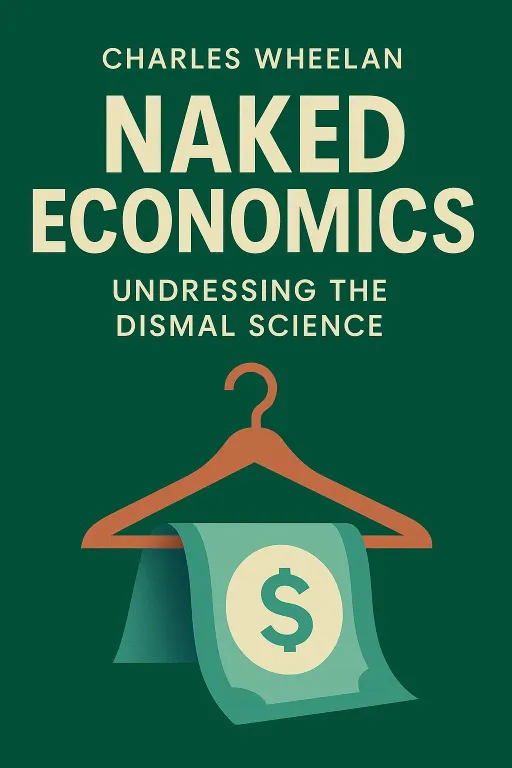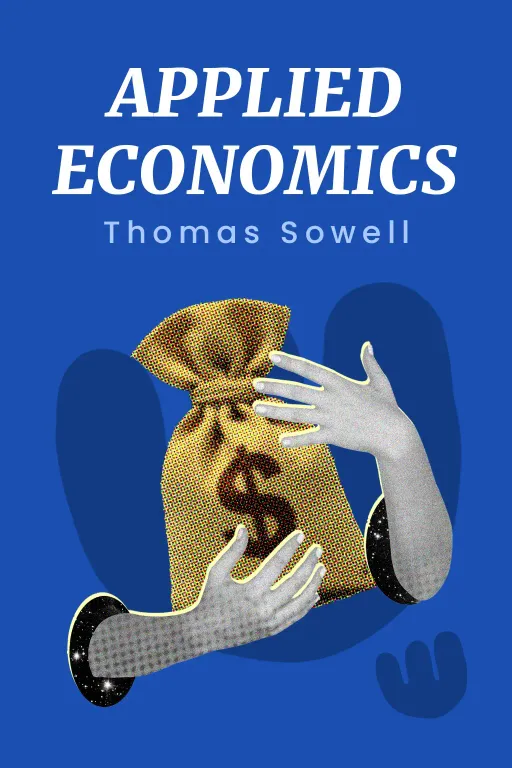
Naked Economics
10 minUndressing the Dismal Science
Introduction
Narrator: Imagine the scene in November 1989. The Berlin Wall, a stark symbol of division, is crumbling. As people chip away at the concrete, creating small holes, something unexpected is passed through from the West: bottles of Coca-Cola. This wasn't a government aid program or a charitable act. It was the work of Douglas Ivester, the head of Coca-Cola Europe, who saw a historic opportunity. He sent his sales force to distribute free Coke, gauging brand recognition by simply shaping his hands like the iconic bottle. Within years, consumption in the former East Germany matched that of the West. This single act of corporate ambition raises a profound question: How does a complex society get the things it wants? Who ensures that millions of people are fed, clothed, and supplied with everything from soda to life-saving medicine? The answer, as explained in Charles Wheelan’s book Naked Economics: Undressing the Dismal Science, lies not in a master plan, but in a set of powerful, often invisible, economic principles that govern our world.
The Amoral Power of the Market
Key Insight 1
Narrator: At its core, a market economy harnesses the power of self-interest to create a system that, for the most part, benefits everyone. The fundamental strength of capitalism is that it aligns the incentives of individuals with broader societal progress. When a company like Coca-Cola rushes into a new market, it isn't driven by a desire to quench the thirst of a newly liberated populace; it's driven by the pursuit of profit. Yet, in doing so, it creates jobs, builds infrastructure, and provides a product that consumers want.
This reveals a crucial truth about markets: they are amoral. The market doesn't provide what we need; it provides what we are willing to pay for. It rewards scarcity, not necessarily intrinsic value. This is why a professional athlete can earn millions for playing a game, while a brilliant teacher earns a fraction of that. The market is a powerful tool for allocating resources, but it doesn't make moral judgments. It simply responds to supply and demand, efficiently coordinating the actions of billions of people without a central authority. The answer to the question "Who feeds Paris?" is that no single person or entity does. The city is fed by countless individuals and firms, each acting in their own self-interest, guided by the signals of prices.
Incentives Are the Levers of the World
Key Insight 2
Narrator: Economics is fundamentally the study of how people respond to incentives. When these incentives are misaligned, the consequences can be counterproductive. A striking example of this is the "SUV arms race" that took place in the United States. When the author and his wife were expecting their first child, they traded in their small Honda Civic for a Ford Explorer. Their private calculation was simple: the larger vehicle felt safer for their family.
However, they didn't factor in the external costs of their decision. Their SUV was less fuel-efficient, contributing more to pollution. More significantly, its size and weight posed a greater risk to occupants of smaller cars in an accident. As more families made the same rational, self-interested decision, the roads became filled with larger vehicles, compelling even more people to "arm" themselves with an SUV for protection. This created a collective action problem where individual rational choices led to a collectively worse outcome: higher fuel consumption, more pollution, and more dangerous roads for everyone. This illustrates a core economic concept: externalities, the gaps between private costs and social costs, which markets alone often fail to solve.
Government is the Essential, Imperfect Referee
Key Insight 3
Narrator: While markets are powerful, they cannot function in a vacuum. They require a stable and predictable environment, which only a functional government can provide. Good government establishes the rule of law, protects property rights, and enforces contracts. Without these foundations, capitalism cannot thrive. The book points to a lawsuit in India between two neighbors, Abdul Waheed and Mohammad Nanhe, over a simple drainage issue. The case was filed in 1961 but didn't come to trial for thirty-nine years, by which time both original parties were dead. This kind of institutional failure stifles economic activity, as no one can confidently invest or do business when basic disputes cannot be resolved.
However, government is an imperfect referee. It is susceptible to influence from organized interests. A classic example is the American mohair subsidy. Created in 1955 to ensure a supply of wool for military uniforms, the subsidy continued for decades after the military had switched to synthetic fibers. Why? Because a small, well-organized group of mohair farmers had a strong incentive to lobby for the subsidy, while the cost was spread so thinly across millions of taxpayers that no one had an incentive to fight it. This demonstrates how the political process can be captured to serve narrow interests, leading to inefficient policies that misallocate resources at the public's expense.
Productivity and Human Capital Are the True Sources of Wealth
Key Insight 4
Narrator: What truly separates the "haves" from the "have-nots," both for individuals and for nations, is human capital. This is the sum of a person's skills, knowledge, creativity, and experience. In the modern economy, wealth is less about physical assets and more about what is in our heads. Productivity—the efficiency with which we convert inputs into outputs—is the ultimate determinant of our standard of living, and human capital is its engine.
Wheelan illustrates this with a stark thought experiment. Imagine dropping 100,000 high school dropouts onto a street corner in Chicago. The result would likely be a social and economic calamity, straining public services and deterring business. Now, imagine dropping 100,000 graduates from top universities in the same spot. They would quickly find jobs, start businesses, pay taxes, and attract further investment, creating a vibrant economic hub. The difference is not the physical location, but the human capital embodied in the two groups. This is why nations that invest in education, health, and training tend to be the most prosperous. They are building the most valuable asset of all: a skilled and productive population.
Globalization is a Double-Edged Sword of Progress
Key Insight 5
Narrator: No topic in economics is more contentious than globalization, and Wheelan argues that we must confront its paradoxes head-on. On one hand, trade creates immense wealth and is arguably the most powerful tool for lifting poor countries out of poverty. On the other hand, it can inflict real and concentrated pain. The closure of the Newton Falls paper mill in upstate New York, which had been the town's economic backbone for a century, is a testament to the devastating impact of foreign competition on specific communities.
Yet, to focus only on the losses is to miss the bigger picture. The book tells the story of Mongkol Latlakorn, a Thai father whose fifteen-year-old daughter worked in a Bangkok factory making clothes for export. The conditions were harsh, and the pay was low. But when asked about it, Mongkol's greatest fear was not that the work was exploitative, but that the factory might close. For his family, that job, however difficult, was a crucial lifeline and a step up from the alternative of rural poverty. This reveals the uncomfortable truth at the heart of the debate: while sweatshops may seem abhorrent from a Western perspective, they often represent the best available option for the people who work in them. Boycotting these goods, Wheelan argues, may do more harm than good, taking away a vital rung on the ladder of economic development.
Conclusion
Narrator: The single most important takeaway from Naked Economics is that economics is not a set of arcane theories but a powerful lens for understanding human behavior and the world we have built. It is the study of how we get what we want, given that we cannot have everything. It forces us to confront the reality of trade-offs, where every choice, whether personal or political, has a cost.
The book’s enduring impact lies in its challenge to our simple moral intuitions. It asks us to consider that policies born from compassion, like banning child labor or protecting domestic industries, can have unintended consequences that harm the very people they are meant to help. By stripping the jargon from the "dismal science," Charles Wheelan empowers us not with easy answers, but with the critical thinking tools to ask better questions and navigate the complex trade-offs that will shape our future.









